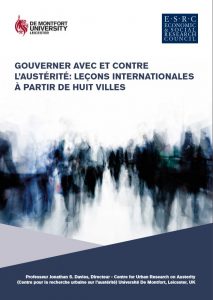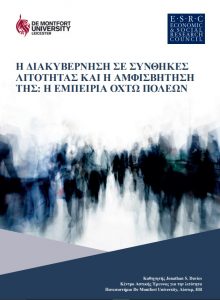
In this post we bring CURA’s book debate on Gianpaolo Baiocchi and Ernesto Ganuza’s book “Popular Democracy” to a close, with a rejoinder by the authors to Adrian Bua’s review, written in response to an opening post describing the main argument of the book.
We thank Adrian Bua and CURA for this invitation to reflect on this important set of issues in the contemporary debate about cities, neoliberalism, and the future of democracy.
Adrian Bua presents us with a set of interesting provocations about the challenges of participation in a neoliberal context based on two major issues: the limits of procedures, and the relations between institutions and social struggles. It is not only a question of political will, as Adrian suggests, but of concrete material struggles. And that is what we are going to try address here, knowing that the challenge is huge, touching as it does, on issues that are central to the political left.
The history of Participatory Budgeting dates to pro-democracy struggles in Brazil in the 1980s, but the jump to its becoming a global icon is inextricably linked to the alterglobalization movement. In the early 2000s the Workers Party of the city of Porto Alegre organized the World Social Forum with the alterglobalization movement. The slogan that emerged, “Another World is Possible”, connected social struggles for a fairer world, which social movements had been claiming on a planetary scale for over ten years, with a participatory experience promoted by a government of the left, which had been implemented in Porto Alegre over the previous decade. There, the desires for a fairer world informed by social justice joined with an instrument based on the participation of the people in the political decision making. This instrument had already proven its ability to distribute wealth in a municipality in the Global South, and therefore, quickly became a global icon against neoliberal policies.
In spite of the seemingly unstoppable advances of neoliberal logics in the next decade, PB became known as an instrument able to lead a public management in the direction of social justice than actual governance outcomes. After the first three World Social Forums, PB experiences multiplied in the world. Spanish experiences come directly from the WSF, where politicians and activists went to the first years. US experiences arrived through an American Social Forum, a derivate of the World Social Forum, a few years later. This is not to say that PB has been promoted by social movements, but the rhetoric surrounding PB come from the WSF and it was used by political representatives to implement this experience in Europe and the US. So, PB in global North was pregnant with ideas about social justice and the democratization of public spaces. How can neoliberalism usurp this idea?
The failure or limits of PB in the Global North, as we discuss in the book, are not due to a lack of tools, but to a political perspective. The history of capitalism that Boltanski and Chiapello outline in The New Spirit of Capitalism already announced the coexistence of artistic logics with the traditional logics of resistance. Participation offers a genuine channel to this artistic expression: more autonomy, self-management and horizontality. That the WB has changed its own way of approaching development, incorporating participation as a driving idea, may be a good example of this. But so are the manuals of new public management so widespread in European countries today. They have made it possible for all types of government, irrespective of their ideology, to see participation as a possible way. The expansion of PB in the world has much to do with this, rather than the ideals of social movements.
However, what we argue is that, despite this, the PB carries with it a radically democratic idea: as it gives autonomy to the people and puts them at the center of the political process, something that we cannot ignore. Participants in these experiences are able to go beyond the boundaries of representation to visualize a radical democratic game, which continually compels them to try to re-connect participation to decision-making processes and social justice, which often involves conflict with the administration promoting PB. For the Indignados in Spain, for example, PBs were always a concrete tool capable of transferring their rhetoric for social justice to a concrete institutional context. The problem is not the tool, but the political perspective with which the PB is implemented.
The dilemmas that Adrian mentions are real. Local governments face constraints in pursuing radical policies, partly because they do not have sufficient power to condition the policies that most affect citizenship. The scales of democracy, to rehearse an old argument of Robert Dahl, are mismatched. Problems are felt locally, and local constituencies routinely elect more governments that are more progressive or radical, than national ones. But local governments can do very little to impact policies, such as employment policies, that are the main concern of their constituents. And in a globalized world, interconnections reduce the autonomy of agents even further. National governments now find their space of maneuver reduced.
But this does not mean that nothing can be done. It does not mean that if in Europe economic decisions have a marked technocratic and neoliberal character, municipal governments can not deploy political measures with other logics. The problem, we insist, is a political one. Nothing prevents the establishment of radical democratic mechanisms in cities. Whether these might come into conflict down the line with policies at other levels of government, or if it might awaken political demands that are more radical than current governance allows, are different questions. Now, the question would be whether a political project of such caliber is really desired. If the PB has always been implemented on the way that caused the least resistance in the cities, disconnecting it from the operative centers of the administrations, we need to question the political projects behind these implementations. Do rulers really want that democratic radicalism? This obviously alludes to a political issue of immense controversy for the political left. But perhaps the movements of indignados in Spain and Occupy in Us were right to stop thinking of utopian horizons, societies that had to be designed beforehand, which always requires experts and political elites, to imagine a democratic radicalization. It is this democratic radicalism that is frightening, even to many leftist militants and activists.
In Madrid and Barcelona, today’s governments, which would be impossible to understand without the protests of indignados, could assume that democratic radicalism more broadly. It is true that it is not only about techniques, but about political culture and that way is very long. This would not mean to reject experts or politicians, but to democratize political spaces. It is true that none of the governments of the two Spanish cities has a majority in their respective municipalities, which conditions their own government program. But they can undoubtedly use more democratic logics in local affairs where they have maneuverability. That will not change the world, but it would help make it more egalitarian and fairer. But above all it would generate concrete referents to follow that way.
The second great question raised by Adrian Bua has to do with the very design of the participatory experience and to what extent we could say that a participatory government can effectively favor a more just and egalitarian politics. We have already mentioned above that we understand that the problems have not to do so much with the techniques as with the political perspective. Here the question raises doubts about the ability of governments to establish democratic institutions from above, reversing the bottom-up logic that has usually been a commonplace for the political left imaginaries. We understand that doubts are more than reasonable considering past experience, but that cannot make us forget that institutions are based in society.
The problem, as we understand it, is not the institution, unless we imagine a world without them, but the type and logic that make institutions work. As the PBs have been designed, we will hardly see large institutional changes, since they are conceived outside the great political nodes in the administrations. If we say that institutional design matters, it is because we find it difficult to think of social change without changing institutions. The PB has been designed in most of the experiences at the margins of institutions, it is that peripheral character that weakens their possibilities of change. Even so, we understand that the very dynamics involved in a participatory budget activates the political imagination of the participants towards less neoliberal logics and, in many cases, leads them to challenge the limits imposed by the promoters of experiences.
Perhaps if the PB is repeated much will be able to generate a political imaginary that serves as the basis for more substantive experiences. Perhaps, also, it only serves to tarnish a new experiment that promised a lot and was unable to face the oligarchical logics of neoliberalism. In any case, participation as a tool does not pose any challenge in its development. There are innumerable techniques capable of converging the lot with participation in the assembly or in a digital environment. The problem is the political perspective that frames participation and everything that implies in a political scenario dominated by neoliberalism: autonomy and horizontality. That is the political radicalism of the project and in turn the great dilemma for political representatives, whether of the left or right. Do we want really radical democratic institutions?
Gianpolo Baiocchi is associate professor of individualized studies and sociology, as well as director of the Urban Democracy Lab and Civic Engagement at the, Gallatin School, New York University.
Ernesto Ganuza is a researcher at the Centre for Advanced Social Studies, Spanish National Research Council (IESA- CSIC) in Cordoba, Spain.
 CURA is delighted to announce our first annual lecture, with Professor Miguel Robles-Duran (New School, New York City) on “The Dialectics of Parallel Urbanization: Cohabitation Strategies and the Politics of Scale”, from 18:00 to 19:30 on the 26th June at De Montfort University, in Leicester.
CURA is delighted to announce our first annual lecture, with Professor Miguel Robles-Duran (New School, New York City) on “The Dialectics of Parallel Urbanization: Cohabitation Strategies and the Politics of Scale”, from 18:00 to 19:30 on the 26th June at De Montfort University, in Leicester.







